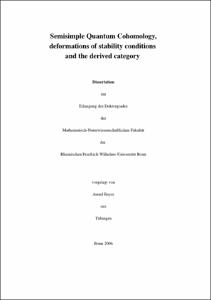Bayer, Arend: Semisimple Quantum Cohomology, deformations of stability conditions and the derived category. - Bonn, 2007. - Dissertation, Rheinische Friedrich-Wilhelms-Universität Bonn.
Online-Ausgabe in bonndoc: https://nbn-resolving.org/urn:nbn:de:hbz:5N-09380
Online-Ausgabe in bonndoc: https://nbn-resolving.org/urn:nbn:de:hbz:5N-09380
@phdthesis{handle:20.500.11811/3038,
urn: https://nbn-resolving.org/urn:nbn:de:hbz:5N-09380,
author = {{Arend Bayer}},
title = {Semisimple Quantum Cohomology, deformations of stability conditions and the derived category},
school = {Rheinische Friedrich-Wilhelms-Universität Bonn},
year = 2007,
note = {The introduction discusses various motivations for the following chapters of the thesis, and their relation to questions around mirror symmetry.
The main theorem of chapter 2 says that if the quantum cohomology of a smooth projective variety V yields a generically semisimple product, then the same holds true for its blow-up at any number of points (theorem 3.1.1). This is a positive test for a conjecture by Dubrovin, which claims that quantum cohomology of V is generically semisimple if and only if its bounded derived category Db(V) has a complete exceptional collection.
Chapter 3 generalizes Bridgeland's notion ofstability condition on a triangulated category. The generalization, a polynomial stability condtion (definition 2.1.4), allows the central charge to have values in complex polynomials instead of complex numbers. We show that polynomial stability conditions have the same deformation properties as Bridgeland's stability conditions (theorem 3.2.5). In section 4, it is shown that every projective variety has a canonical family of polynomial stability conditions.
In chapter 4, we define and study the notion of a weighted stable map (definition 2.1.2), depending on a set of weights. We show the existence of moduli spaces of weighted stable maps as proper Deligne-Mumford stacks of finite type (theorem 2.1.4), and study in detail their birational behaviour under changes of weights (section 4). We introduce a category of weighted marked graphs in section 6, and show that it keeps track of the boundary components of the moduli spaces, and natural morphisms between them. We introduce weighted Gromov-Witten invariants by defining virtual fundamental classes, and prove that these satisfy all properties to be expected (sections 5 and 7). In particular, we show that Gromov-Witten invariants without gravitational descendants do not depend on the choice of weights.},
url = {https://hdl.handle.net/20.500.11811/3038}
}
urn: https://nbn-resolving.org/urn:nbn:de:hbz:5N-09380,
author = {{Arend Bayer}},
title = {Semisimple Quantum Cohomology, deformations of stability conditions and the derived category},
school = {Rheinische Friedrich-Wilhelms-Universität Bonn},
year = 2007,
note = {The introduction discusses various motivations for the following chapters of the thesis, and their relation to questions around mirror symmetry.
The main theorem of chapter 2 says that if the quantum cohomology of a smooth projective variety V yields a generically semisimple product, then the same holds true for its blow-up at any number of points (theorem 3.1.1). This is a positive test for a conjecture by Dubrovin, which claims that quantum cohomology of V is generically semisimple if and only if its bounded derived category Db(V) has a complete exceptional collection.
Chapter 3 generalizes Bridgeland's notion ofstability condition on a triangulated category. The generalization, a polynomial stability condtion (definition 2.1.4), allows the central charge to have values in complex polynomials instead of complex numbers. We show that polynomial stability conditions have the same deformation properties as Bridgeland's stability conditions (theorem 3.2.5). In section 4, it is shown that every projective variety has a canonical family of polynomial stability conditions.
In chapter 4, we define and study the notion of a weighted stable map (definition 2.1.2), depending on a set of weights. We show the existence of moduli spaces of weighted stable maps as proper Deligne-Mumford stacks of finite type (theorem 2.1.4), and study in detail their birational behaviour under changes of weights (section 4). We introduce a category of weighted marked graphs in section 6, and show that it keeps track of the boundary components of the moduli spaces, and natural morphisms between them. We introduce weighted Gromov-Witten invariants by defining virtual fundamental classes, and prove that these satisfy all properties to be expected (sections 5 and 7). In particular, we show that Gromov-Witten invariants without gravitational descendants do not depend on the choice of weights.},
url = {https://hdl.handle.net/20.500.11811/3038}
}






